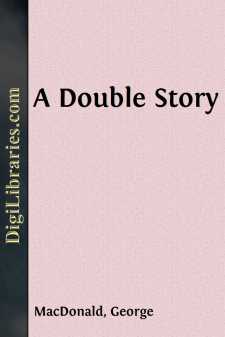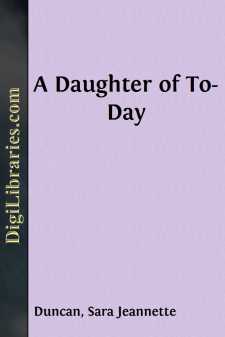Fiction
- Action & Adventure 180
- Biographical 15
- Christian 59
- Classics 6965
- Coming of Age 5
- Contemporary Women 3
- Erotica 8
- Espionage/Intrigue 12
- Fairy Tales, Folklore & Mythology 236
- Family Life 169
- Fantasy 117
- Gay 1
- General 596
- Ghost 32
- Historical 808
- Horror 43
- Humorous 160
- Jewish 25
- Legal 4
- Medical 22
- Mystery & Detective 315
- Political 49
- Psychological 41
- Religious 64
- Romance 159
- Sagas 11
- Science Fiction 730
- Sea Stories 113
- Short Stories (single author) 537
- Sports 10
- Suspense 1
- Technological 8
- Thrillers 2
- Urban Life 31
- Visionary & Metaphysical 1
- War & Military 173
- Westerns 199
Fiction Books
Sort by:
by:
Anthony Trollope
INTRODUCTION Anthony Trollope was an established novelist of great renown when Nina Balatka was published in 1866, twenty years after his first novel. Except for La Vendée, his third novel, set in France during the Revolution, all his previous works were set in England or Ireland and dealt with the upper levels of society: the nobility and the landed gentry (wealthy or impoverished), and a few...
more...
In this little Extravaganza, I have done just what I intended. I have attempted to describe, in an auto-biographical sort of way, a well-meaning, but somewhat vain young gentleman, who, having flirted desperately with the Magazines, takes it into his silly head to write a novel, all the chapters of which are laid before the reader, with some running criticism by T. James Barescythe, Esquire, the...
more...
by:
George MacDonald
There was a certain country where things used to go rather oddly. For instance, you could never tell whether it was going to rain or hail, or whether or not the milk was going to turn sour. It was impossible to say whether the next baby would be a boy, or a girl, or even, after he was a week old, whether he would wake sweet-tempered or cross. In strict accordance with the peculiar nature of this...
more...
by:
Alex. Ewing
The ever-fluctuating vicissitudes of human life had once more scattered our little group of friends asunder. Sylvester had gone back to his country home; Ottmar had travelled away on business, and so had Cyprian; Vincent was still in the town, but (after his accustomed fashion) he had disappeared in the turmoil, and was nowhere to be seen; Lothair was nursing Theodore, who had been laid on a bed of...
more...
CHAPTER I. Miss Kimpsey dropped into an arm-chair in Mrs. Leslie Bell's drawing-room and crossed her small dusty feet before her while she waited for Mrs. Leslie Bell. Sitting there, thinking a little of how tired she was and a great deal of what she had come to say, Miss Kimpsey enjoyed a sense of consideration that came through the ceiling with the muffled sound of rapid footsteps in the chamber...
more...
by:
Winthrop Packard
OLD PLYMOUTH TRAILS "The breaking waves dashed highOn a stern and rock-bound coastAnd the woods against a stormy skyTheir giant branches tossed." So sang Felicia D. Hemans in the early years of the last century and she has been much derided by the thoughtless and irreverent who have said that the landing of the Pilgrims was not on a stern and rock-bound coast. Such scoffers evidently never...
more...
by:
John Burroughs
I BIRDS AND POETS "In summer, when the shawes be shene,And leaves be large and long,It is full merry in fair forestTo hear the fowlés' song.The wood-wele sang, and wolde not cease,Sitting upon the spray;So loud, it wakened Robin HoodIn the greenwood where he lay." It might almost be said that the birds are all birds of the poets and of no one else, because it is only the poetical...
more...
by:
Mark Rutherford
GIDEON. The story which Jotham told his children on the day before his death concerning the achievements of his father Gideon—His comments and those of Time thereon. I am an old man, and I desire before I die to tell you more fully the achievements of your grandfather. Strange that this day much that I had forgotten comes back to me clearly. During his youth the children of the East possessed the...
more...
by:
E. E. Adams
Government and Rebellion. An evil man seeketh only rebellion; therefore a cruel messenger shall be sent against him.--Prov. xvii. 11. We have in these words this plain announcement--that Rebellion is a crime, and shall be visited with terrible judgment. Solomon here speaks his own convictions; God declares his thought, and utters his sanction of law. This is also the expression of natural...
more...
Chapter I."Good morrow, coz.Good morrow, sweet Hero."SHAKSPEARE.When Mr. Effingham determined to return home, he sent orders to his agent to prepare his town-house in New-York for his reception, intending to pass a month or two in it, then to repair to Washington for a few weeks, at the close of its season, and to visit his country residence when the spring should fairly open. Accordingly, Eve...
more...











